Extraordinary Rendition, Guantanamo, Habeas Corpus, Human Rights, Supreme Court, Surveillance, Targeting Muslims, Torture, Truth to Power
Podcast: Play in new window | Download
Updates:
——-
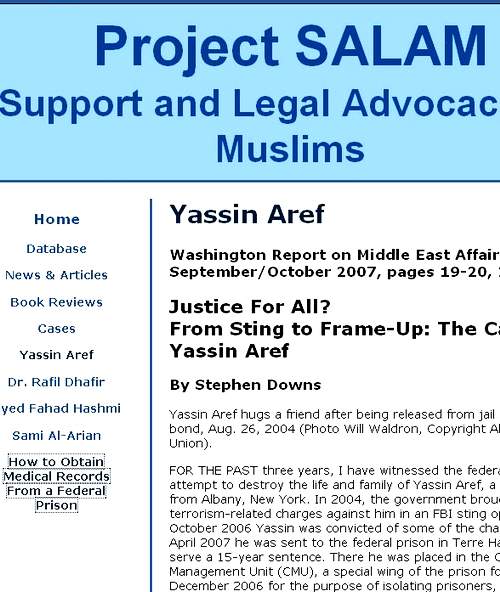
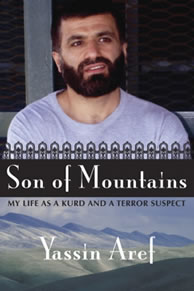
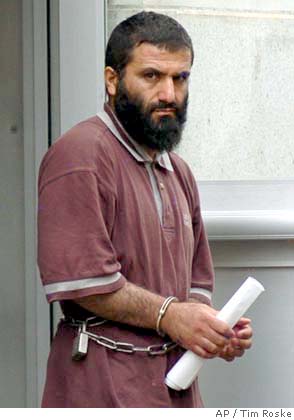
Steve Downs: The Yassin Aref Story and Muslim Database, Project Salam
Imam Yassin Aref is among numerous Muslim men in the United States who were targeted by the FBI framed and wrongly convicted. Aref is Iraqi Kurd who came to Albany, New York in 1999 as refugee from Kurdistan. He later became the leader at a local mosque. After 9/11 the FBI began to illegally wiretap and eavesdrop on the mosque and Yassin. It was later reported in the New York Times that these wiretaps were conducted without court approval. As retired attorney Stephen Downs explains, Yassin is one of 400 in a database site, Project Salam that keeps track of Muslim men in United States prison.
Stephen Downs:
- Whatever it was that triggered suspicion, the FBI decided they wanted to convict Yassir
- So, they set up sting operation, it was run by a guy who was convicted of a number of felonies.
- Yassin was convicted and sentence to 15 years in communication management units at Terra Haute Prison, Indiana,
- They’re trying to seal them off from the prison population and society at large.
- They’re being treated like they have some horrible disease and would infect anyone that they’d come in contact with.
- I have a suspicion that the Bush Administration was thinking of closing Guantanamo and I can’t help thinking that because the size of this place is about right, that they’d consider transferring prisoners there, but that didn’t happen.
- There is room for 400 prisoners, there are 50 or 60.
- We began to realize that all over the country there were groups that were forming around certain people in their communities that had been simply, locked away.
- So, we got together at Albany Law School and decided to set up a database of all the Muslims in the country who had been improperly gone after. They were under suspicion from the government for some reason.
- We just wrote to President Obama and Attorney General Holder regarding what has happened under the Bush Administration in that we change the paradigm in how we prosecute people.
- Now we’re going to be writing letters about specific cases. We got 900 people to sign the first letter.
- We are asking people to adopt a defendant.
- We have about 400 Muslims in the database. We can’t say that all 400 are innocent. Some people are overcharged.
- We appealed and lost. There was a secret appeal and a top secret brief that even the prosecutor wasn’t allowed to see.
- The appellate decision was harsh, it either mischaracterized what we had to say or brushed them aside immediately.
- We thought it was a victory because the standard is a 30 year prison sentence, based on the all the “enhancements” that they added.
Guest – Stephen Downs, a retired New York State attorney and a volunteer attorney for the Yassin Aref case.
———————————————–
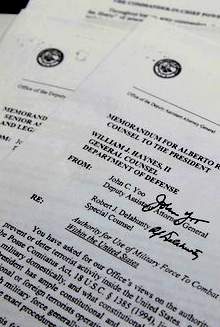
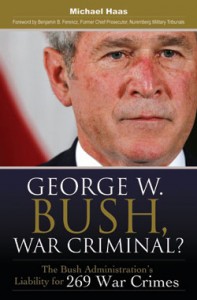
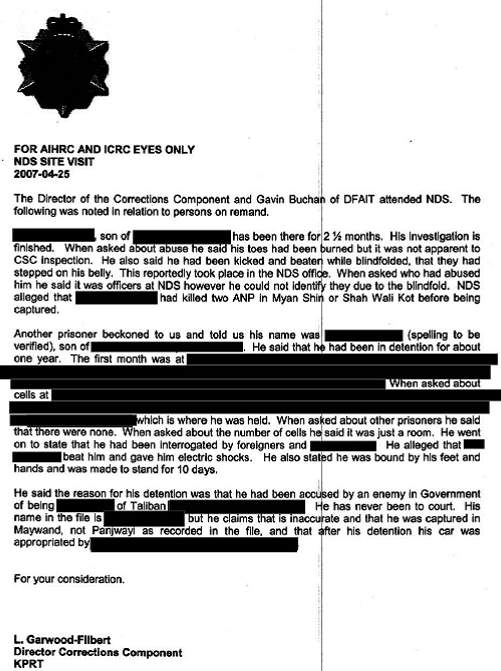
George W. Bush, War Criminal ? by Michael Haas
In the book titled George W. Bush, War Criminal? author Michael Haas counts 269 war crimes that the Bush Administration are liable to be prosecuted for. He itemizes each war crime into a specific category of four classes, such 36 war crimes committed in the conduct of war, 175 war crimes committed in the treatment of prisoners and so on. This book carefully documents the war crime evidence, making it quick work to investigate how George W. Bush, the military officers under his command and the staff in his administration can be brought to justice.
Michael Haas:
- The illegality of the war.
- The misconduct during war, militarily, the mistreatment of prisoner.
- The misgovernment of the occupations of Iraq and Afghanistan.
- The decision to indiscriminately bomb without giving proper notice to the civilian population and then the use of illegal weapons such as Daisy Cutters, White Phosphorous and Depleted Uranium Weapons which not only affected the civilian population in Iraq, but the American soldiers who came in to occupy.
- I have a table in the book indicating 40 international agreements that are war crimes treaties.
- The most prominent to begin with is the Red Cross Convention of 1864 and then going on to the Hague Conventions, the Geneva Conventions before and after WWII and then the subsequent conventions against torture and forced disappearances.
- Any kind of torture is illegal involving prisoners of war.
- When they couldn’t get information out of Guantanamo prisoners, the Geneva Convention orders to not torture prisoners was countermanded to try other techniques by then Secretary of Defense Donald Rumsfeld – by executive order through George Bush.
- Most of the war crimes are from the mistreatment of prisoners, because the Geneva Convention is very detailed and specific about what cannot be done.
- The Bush executive order details what had happened and in fact is an admission of abuse.
- Extraordinary renditions, to send someone to another country to be tortured is itself a war crime.
- War crimes are ongoing now, they’re happening under the Obama Administration.
- If we can’t focus on now, which apparently isn’t happening, then we can’t learn lessons from the past.
- At Guantanamo, the following war crimes are taking place: Failure to transmit legal documents to prisoners, secret judicial proceedings, refusal to cooperate in investigations and prosecution of torturers. The wreckless endangerment of health in prison, the violation of medical ethics, that is the force feeding. Indefinite imprisonment of children, cruel treatment, that is the beatings after force feedings.
- These are what I’ve counted to be 22 war crimes since the inauguration of President Obama.
- The thesis of the book is to have a truth commission on the war crimes published in this book so that people know, the public what is a war crime, what is not a war crime.
- Some of the war crimes are only heresay right now, so we need sworn testimony, though some of the war crimes are signed by George W Bush. www.uswarcrimes.com
- I was writing a textbook on human rights, I’m a scholar, political scientist, while I was reading the Geneva Conventions to summarize them for the purpose of a chapter, I was also reading the newspaper, I realized that the violations of the Geneva Conventions, and reading them item by item – its very dry reading, but I can make it much more interesting.
- I quit my job as a professor, and relentlessly began getting up at 5 AM and going to bed at 1AM day after day to finish this book, so it would be coming out just a few days before the inauguration of the new president.
Guest – Michael Haas, has written more than 30 books on human rights, he is currently Professor Emeritus of Political Science at the University of Hawaii and the Chairman of the International Academic Advisory Board of the University of Cambodia. He played a role in stopping the secret funding of the Khmer Rouge by the administration of President George H. W. Bush. He has taught political science at the University of London, Northwestern University, Purdue University, and the University of California, Riverside.The argument is that all 4 types of war crimes were violated with great impunity by George W Bush and members of his administration.
——————————————-
Afghanistan War, Civil Liberties, Criminalizing Dissent, Extraordinary Rendition, Guantanamo, Habeas Corpus, Human Rights, Iraq Veterans, Iraq War, Prosecution of the Bush Administration, Supreme Court, Surveillance, Targeting Muslims, Torture
Podcast: Play in new window | Download
Updates:
————
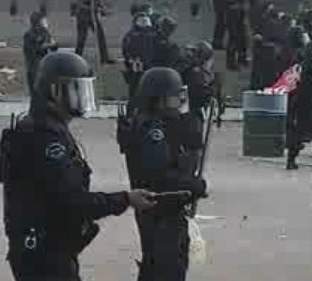


13 Million Dollar Payout in May Day LAPD Police Abuse Cases
In a landmark class action lawsuit settlement, the Los Angeles city council agreed to pay nearly 13 million dollars to those injured or mistreated in the 2007 May Day demonstration in MacArthur Park. As the march ended, LAPD riot police were filmed by camera crews using excessive force, firing rubber bullets and striking people with batons. Dozens were injured in the melee and the footage was seen around the world. The 13 million dollar settlement was part of a larger portion of nearly 300 May Day claims.
Carol Sobel:
- There was an immigrants rights march in MacArthur Park in Los Angeles on May 1st 2007, there has been for the last 7 years. The police didn’t want to give the group a permit to march in the streets.
- There are about 20 lawyers on this case, the National Lawyers Guild, the Guild’s Police Accountability Project and MALDEF, the Mexican American Legal Defense Education Fund.
- As around 10 thousand people approached the park, police “forgot” to direct people into the park.
- The rally was at the Northwest corner of park, so marchers had to cross an 8 lane highway that divides the park. This created chaos of which the problems arose.
- There was no instruction, people didn’t know where they were supposed to go.
- Then people got near police on motorcycles, they used their motorcycles to hit protesters. This was happening as an Aztec circle dance performance closed the march and opened the rally.
- Some protesters through trash, plastic water bottles at police. It was heard that the police said “We need to get rid of these people now.” Police were not giving orders to disperse, they simply said “move”.. to the 10 thousand people in the park.
- The officers were speaking only English, the crowd spoke almost all Spanish.
- Families had no idea why the police were coming with riot gear. While police were saying to move, people were thinking, “well I didn’t do anything wrong, they could’nt be talking to me.”
- So officers began knocking people down and hitting people, firing pellets, it was total chaos.
- 140 rounds of less lethal munitions were randomly fired into the crowds.
- The police report also stated there was no probable cause, no reason to go after the marchers.
- Lesson: It’s very difficult to change the culture of a police department. The police department can’t engage in this behavior, because we can’t afford it as a city.
Guest – California civil rights attorney Carol Sobel, who represented some of the injured. In 2000 Carol was struck by police pellets while serving as a legal observer during the Democratic National Convention.
———————–



Nora Eisenberg: When You Come Home
We’re pleased to have with us Nora Eisenberg, she’s the author of the recent book When You Come Home. It is a powerful novel that acknowledges the physical and psychological effects of veterans returning from Operation Desert Storm-The Persian Gulf War (2 August 1990 – 28 February 1991). In this beautifully written ant-war fiction, Nora delves into the corrosive effects post war combat has on the families and communities that are called on to nurture veterans returning home. Mimi is the main character who’s husband was killed in Vietnam, her 20 year old son Tony, a marine reservist, has returned from the Gulf War and there’s Tony’s childhood sweetheart, Lily who was raised by Mimi after her parents disappeared.
One book review describes When You Come Home this way: “In 1991, troops sent to Iraq for the first Gulf War returned home with a litany of physical, neurological, and psychological symptoms that collectively became known as Gulf War syndrome, a subject seldom dealt with in works of fiction. Eisenberg poignantly demonstrates that casualties of war occur both on and off the battlefield and ironically illustrates the vivid consequences when those in charge of veterans’ postwar care fail to meaningfully “support our troops.”
Nora Eisenberg:
- The First Gulf War – “The Good War”, 5 weeks of censorship and fabrication. Fabricated by a Washington based PR firm – Hill and Nolton. The campaign was headed by Craig Fuller. Fuller was also Chief of Staff for George H.W. Bush. Fuller took charge of the campaign to impress the public of what villians the Iraqis were.
- The firm brought this young girl to testify in front of a Congressional Committee – She claimed to work at a maternity ward in Kuwait. “The mean Iraqi soldiers” came in and hurled nearly 300 babies from their incubators and were left to die on the floor.
- This young girl was part of the Kuwaiti Royal Family, her father was Washington / Kuwait ambassador.
- All part of a 10 million dollar PR campaign with Hill and Nolton.
- Aside from the no-fly zones and sanctions, the deaths of Iraqis were massive and continuing.
- I’ve been following the deteriorating health system in Iraq and the rise of disease leading to the deaths of 2 million Iraqi children.
- I started writing this book with the “bad” war looming and with a sense that the ’91 war wasn’t over at all.
- I thought, are we going to kill millions again and get off scott-free, does it really work that way?
- Gulf War Illness, even among progressive people, there remains very little awareness of what this disease is. It attacks the respiratory system, the nervous system, it’s a neuro-toxic event.
- These soldiers got sick, immediately. Some say they got sick after swallowing an anti-nerve gas pill.
- When they were around the insecticides that were soaking the tents, they felt sick immediately, vertigo, stomach cramps.
- The soldiers loved ones, pets and wives coming down with similar symptoms, by proximity.
- It’s taken almost 20 years for Congress to say what the veterans already knew, that they were poisoned.
- A report delivered by high profile doctors at Roberta White say the soldiers were exposed to neuro-toxins. These were not neuro-toxins from Saddam Hussein.
- Those are main culprits, there are other terrible exposures that came out in a report last November.
- Such as the exposure to sarin in a weapons depository that affected 2-3 hundred thousand US soldiers.
- Nearly 15 thousand have died from Gulf War Illness. We have nearly 400 thousand US soldiers coming back as patients / nearly 40 percent are psychiatric patients.
Guest – Nora Eisenberg, New York City novelist and professor of English at the City University of New York (LaGuardia) and directs CUNY’s Faculty Publications Program. The War at Home ws a Washington Post Rave Book of the Year for 2002 and Just the Way You Want Me was awarded the 2004 Gold Prize in General Fiction from Foreword, the weekly of independent publishing. Her short stories, essays, and reviews have appeared in The Village Voice, Partisan Review, the LA Times, Tikkun., and numerous anthologies.
——————————————————–
Censorship, Civil Liberties, Habeas Corpus, Human Rights, Supreme Court, Targeting Muslims, Torture, Truth to Power
Podcast: Play in new window | Download
Updates:
—


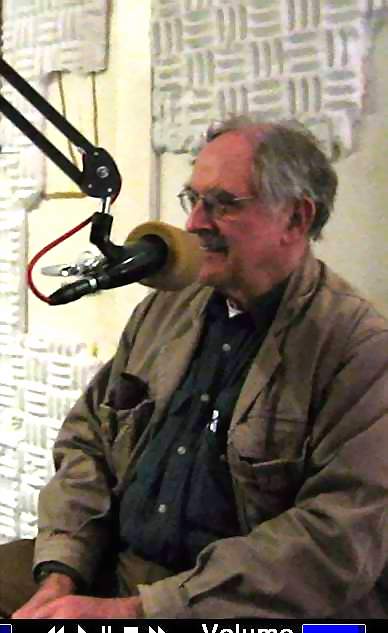
Zionist Critic Joel Kovel: Terminated From Teaching Position At Bard College
Since author and professor Joel Kovel, published, Overcoming Zionism, Creating a Single Democratic State in Israel and Palestine, he has endured accusations of anti-semitism, Michigan Press temporarily suspended distribution of the book – calling it “hate speech” and recently Kovel was terminated from his teaching position as a professor of 21 years at Bard College. Joel Kovel is back with us on Law and Disorder to give us a brief chronology of these controversies and deliberate set backs.
Joel Kovel:
- I was terminated from an endowed chair (at Bard College) 3 weeks after I published an article critical of Israel and Zionism. Then asked to resign 3 weeks after I published another article critical of Zionism.
- This is a good example of the kinds of repression that the Zionist lobbies impose upon the people who dissent on the unholy relationship between Israel and the United States.
- Most campuses in this country are highly Zionist in organization, but Bard is exceptionally so. The president is the conductor of the Jerusalem symphony orchestra. He says he makes 10 trips a year to Israel. He brought the symphony around and played the Israel national anthem and the audience all stood, which I thought was just outrageous.
- I tried to give a lecture to call attention to that and was shunned.
- My book Overcoming Zionism did not only focus in on the occupation of Palestine or Israeli abuses but the fundamental structure of the Israeli state which is animated by Zionism which leads to all of the woes and abuses of human rights.
- Unless you deal at that level and point towards an overcoming and not just Zionism, but the special status and you treat Israel as we treated South Africa for equivalent crimes of Apartheid; namely a systematic racism against an indigenous people.
- So I started catching hell from the Zionist lobbies. “I’m anti-semitic, full of hate.” They panicked the University of Michigan Press, and they pulled the book.
- It’s remarkable that Bard College which is very proud of its image of being a bastion of defense of freedom of speech. Not a single peep. So I knew we were in serious straights at that point.
- I put up an anti-Zionist course last fall, which was evaluated. The evaluation was dripping with innuendo, and references to me losing my grip as a teacher, and was basically the preliminary to my termination at Bard College after 21 years.
- The alumni has supported me, the faculty not so. This is important because it is now a place that has instilled timidity and even terror amongst the faculty.
- They’re intimidated and its distressing that you can take people who are sophisticated and ostensibly good values and they will not bring themselves to utter basic criticism of an event that has shocked the world and caused millions to change their view of Israel.
- Bard is creating a new class of bourgeois who would get the jobs, auto dealerships, burger kings, whatever they’re planning.
- It’s typical of a liberal institution to use generous impulses and they want to make something good happen, but we also know how many pitfalls there are. Just think of all the universities that were founded by the British and the French to secure their empires. I think it has a lot to do with that.
Guest- Joel Kovel, scholar and an activist. In the former capacity he has published nine books and over a hundred articles and reviews. His books include White Racism, which was nominated for a National Book Award in 1972; A Complete Guide to Therapy; The Age of Desire (in which his work in the psychiatric-psychoanalytic system is detailed); Against the State of Nuclear Terror; In Nicaragua; The Radical Spirit; History and Spirit(1991) – Committee for Open Discussion of Zionism
—–

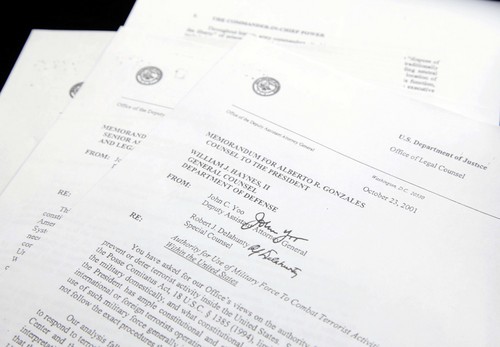

Office of Legal Counsel Release Secret Memos: First Batch
Last week the Justice Department released internal Bush documents that revealed more legal memos authorizing torture and interrogation outside of the United States. These “police state” memos include the military’s search, detention or trial of civilians in the U.S. without congressional input and a newly disclosed opinion by torture memo author John Yoo who argued that constitutional provisions ensuring free speech and barring warrantless searches could be disregarded by the president in wartime.
Scott Horton:
- The Bush Administration kept them secret to the very end. The Obama transition team went in to get the memos and were told you can’t have them, you can’t see them.
- These memos were published because they were sought in litigation. Specifically in the lawsuit – Padilla v Yoo
- Memorandum Oct 25, 2001 – talks about the ability of the Bush Administration to drop a bomb on my house? Unreasonable search and seizure doesn’t apply if the president engages in domestic military operations. Neither does the First Amendment.
- It says the Posse Comitatus Act is essentially a dead letter.
- What they’ve said in this memo is that 200 years of Constitutional history is gone.
- These memos have an instrumental role. They set the legal policy, that’s in accordance with the Judiciary Act of 1789.
- There seems to be a vague presumption that all these memorandum are invalid. The OLC will be repudiating these memos and put a priority on publishing them because they welcome public participation in this process.
- Michael Ratner: Can you really prosecute John Yoo for these torture memos?
- You look at his public statements of which there are hundreds, he seems to understand that he has an acceptable legal defense, because everything is geared to “that’s my honest opinion and nothing has changed” Is that argument correct? No, it’s not.
- He says he was asked his opinion, he gave his opinion. I think what we will see is that he was told in meetings in the White House, before he wrote opinions, that a torture program was put in place, pushback was coming from career lawyers saying this is unlawful conduct .. and he was told we need you to protect us from this and write legal memos.
- Implying, that these memos had an instrumental role to silence critical lawyers and push the torture program, already in motion, forward.
- If that’s the case, he’s beyond the role of advisor. Mis-stating advice and corrupting the law.. .that is the precedent to be liable for war crimes. The most likely outcome from all of this is a lot of disbarmments
Guest – New York attorney Scott Horton, known for his work in human rights law and the law of armed conflict. Scott is also the contributing editor to Harper’s Magazine
———————————-

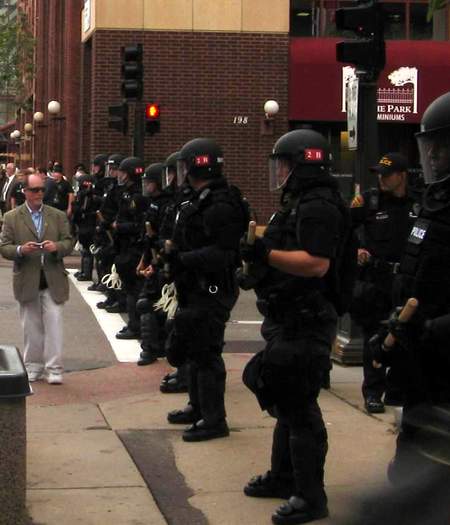
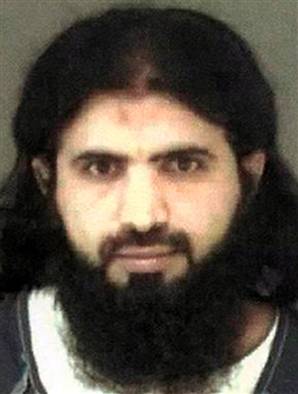
Ali Saleh Kahlah al Marri Indicted on Terrorism Charges
Last week, a federal court charged the only enemy combatant with two counts of providing material support to Al Qaeda. This will allow his release from six years of military custody and into the criminal justice system. The ACLU says this is exactly where the case should be to determine whether al-Marri is guilty. Jonathan Hafetz, working as al-Marri’s lead defense counsel says despite the news, he will not drop the habeas corpus challenge in the case.
Michael Ratner Update: Since this interview, Al-Marri’s enemy combatant status was wiped off the books. The Obama Administration in it’s brief, essentially insisted they might well have the right to hold people as enemy combatants. As it now stands, the president has the power to hold a person in the United States as an enemy combatant.
Attorney Jonathan Hafetz:
- On Feb 27, the US government unsealed an indictment that had just been filed, in the central district of Ilinois, charging Mr. Al-Marri with 2 counts of material support for terrorism.
- At the same time the government filed a motion in the Supreme Court asking to dismiss Mr. Al-Marri’s appeal claiming it was moot.
- Michael Ratner: Now this was an appeal that was going to test the power of the president to detain as unlawful enemy combatants, people in the United States?
- This sweeping power, that the president could seize and militarily detain potentially with life without trial, any individual including a US legal resident and a US citizen, based on the assertion that they were involved in terrorist activities.
- Since 9/11, this policy is finally being called into account in the Supreme Court. The Obama Administration effectively refused to defend the policy.
- In their motion paper in the Supreme Court, when they were seeking to have the case thrown out of the Supreme Court, the Obama Administration did not renounce the policy as they are trying to shield this policy of military detention from review but at the same time they’re not renouncing it.
- We filed an opposition a motion saying that the case is not moot because while the government has charged Mr Al-Marri, it has not renounced its policy or properly detaining US residents or American citizens within the United States.
- So, the Obama Administration is trying to keep all it’s options open avoiding review of this repugnent and unlawful policy that’s been in place since 9/11.
- We hope in our opposition that even if the court dismisses the case as moot, it must take one measure which is to effectively overturn the lower court’s decision in upholding the president’s power so that decision (Executive power to detain US enemy combatants) is not on the books.
Guest – ACLU attorney Jonathan Hafetz with the National Security Project.
————————————————————
Afghanistan War, Civil Liberties, Extraordinary Rendition, Guantanamo, Habeas Corpus, Human Rights, Iraq War, Supreme Court, Surveillance, Targeting Muslims, Torture, Truth to Power
Podcast: Play in new window | Download
The First 100 Days – Part 3

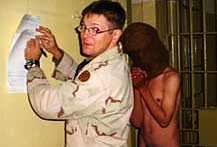

Private Military Contractors – Susan Burke
We go now to look at the abuse of force by Private Military Contractors and their role in illegal torture tactics and interrogation. In one case currently in litigation, four former Abu Ghraib detainees are suing two U.S. military contractor corporations and three individual contractors. The four were wrongly imprisoned, tortured and later released without charge.
According to the complaints, the defendants abused detainees physically and mentally and then destroyed documents, videos and photographs; prevented the reporting of the torture and abuse to the International Committee of the Red Cross. They actually hid detainees and other prisoners from the Red Cross; and misled non_conspiring military and government officials about the state of affairs at the Iraq prisons.
The defendants are CACI International Inc. and CACI Premier Technology, Inc., of Arlington, Va.; L-3 Services Inc., an Alexandria, Va.-based division of L-3 Communications Corp. and three individual contractors, Adel Nakhla, of Maryland, Timothy Dugan, of Ohio, and Daniel Johnson, of Seattle.
Susan Burke:
- Blackwater case pending before judge reggie walter in district of columbia federal court.
Nassir massacre case
- representing the families and people injured in that massacre. in the meantime the justice dept is looking into indicting blackwater soldiers
- Titan and CACI International Inc
- The CACI International Inc case on interrogation, the court says that this interrogation company could be liable because they exercised corporate control over the interrogators.
- The same court said the translator company L3 could not be held liable because they turned over the translators to the military.
- There are appeals on both issues, they’ve been briefed and are waiting for oral arguement.
- during the appeals, Susan’s lawfirm has been contacted by many additional victims.
- “As I litigate these cases, it struck me that we really need to stop these corporations from acting as if they are the United States.
- All these companies are trying to wrap themselves in sovereign immunity, wrap the flag around themselves. and say that we simply can’t even look at what they did.
- One of the companies CACI International Inc sued for defamation, because somebody dared to criticize them. Rhandi Rhodes the talk show host.
- I would like to see immediately a real push to make the government’s position real clear.
- Corporations are not the United States and should not automatically be entitled any type of immunity.
- The Bremer order which has been in effect has insulated them from being sued in Iraq.
- As a result the Iraqis who want to obtain justice have to come to the United States.
- By allowing there to be a derogation to evade, the laws in black and white that are on the decks right now that say,
you can not hire soldiers.
- By the fact that those laws are being ignored and we’re increasing our firepower with mercenaries, the current administration has essentially bought its way from having to draft people.
- Its a troubling thing because we’ve created a class of mercenaries.
- They define themselves as mercs
- They are soldiers for hire, they’ll fight for anyone who pays them.
- That’s why we have to clamp down and enforce the law against the existence of mercenaries,
- We’ve got to take away the veneer of legitimacy, what the defense industry has thrown over the illegal mercenary industry.
—————————————-
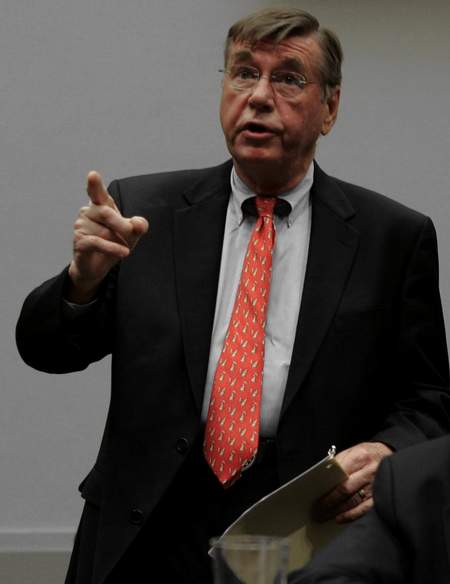


Wide View – Research Professor of Law, Michael Tigar
Michael Tigar is an expert in Constitutional Law and the Supreme Court. He has represented Terry Nichols of the Oklahoma City Bombing, Angela Davis, and Lynne Stewart. Tigar outlines several steps the Obama Administration must do to turn back the major breaches in U.S. civil liberties.
Michael Tigar:
- There is now a systematic breaking down of all barriers against government intrusion into the private lives of people.
- Alien Enemy Combatants: A creation of a new class of people who are thought to be utterly right-less, both as to whether they can be detained, the conditions of their detention, and the manner in which they can be held and interrogated.
- Meanwhile, we have legal fictions such as the Vice President saying he’s neither a member of the executive or legislative branch, and therefore being subject to the rules of both is subject to the rules of neither.
- We have justice system staffed with people whose only qualification is their asserted ideological purity.
- We have two aggressive wars, all done to the tune of the most massive federal debts in history.
- This, accompanied by the largest transfer of wealth from the poor, and working class to the already wealthy, coupled with the dismantling of regulatory barriers of how greed and avarice operate.
- It is the lack of any significant organized resistance from legislators, and with some few bright exceptions, judges and lawyers that define for us the task that lies ahead.
- Eric Holder, a good lawyer, was among the group of people in the Clinton administration that even though they had all the evidence, that they would not prosecute Pinochet.
- National State Secrets: the case of journalist Quentin Reynolds who took a ride on an Air Force jet and it crashed, his widow sued under the federal tort claims act saying that she thought there was negligence. The United States convinced the Supreme Court that to disclose the reasons why that plane crashed might involve state secrets, and that she should not be able to sue.
- Sixty years later the maintenance file on that plane was on unsealed. It turned out that it was a routine maintenance error that caused the crash. Behind the curtain of states secrets is illegality and mendacity.
- How many years did it take to get Pinochet for any kind of proposed criminal accountability, almost 20, because of states secrets.
- The tort system, that is the way we enforce rules about safe products, it’s the way that we enforce the rules about the toxic substances that poison people, it’s the way that we deal with the kleptocracy that rules wall street.
- It’s so well tested – Marbury v Madison 1803 – Chief Justice Marshall said that he could decide a case was unconstitutional.
Guest – Michael Tigar, a criminal defense attorney who has represented some of the country’s most controversial clients. He is also a member of the Duke University Law School faculty.
——–
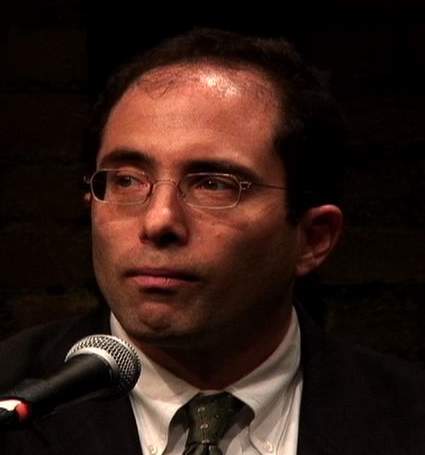
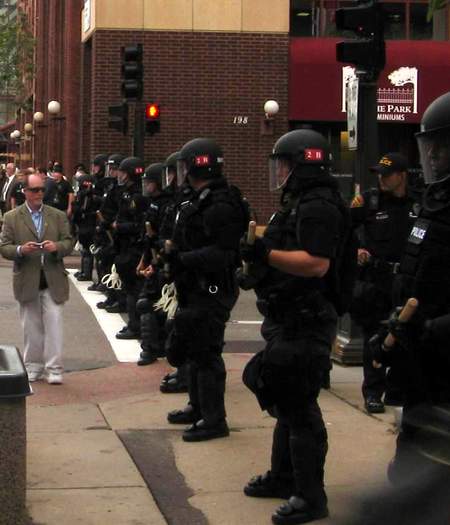
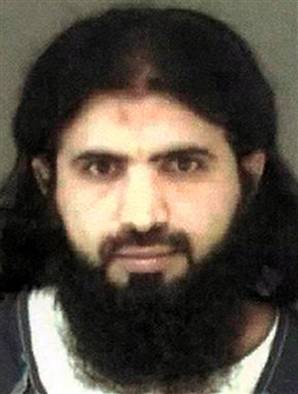
Jonathan Hafetz: Enemy Combatant:
In June of last year, an en banc Federal Appeals Court in Virginia ruled 5-4 that the Bush Administration could subject Ali Al-Marri to indefinite detention even though he was a resident of the United States. The court in the fourth circuit ruled that US residents could be locked up indefinitely as enemy combatants even though they were never charged with a crime. Al-Marri is the only enemy combatant currently in detention and without charges in the United States.
Jonathan Hafetz:
- Can the president declare legal residents including American citizens, enemy combatants, deprive them a right to a trial and hold them indefinitely.
- This, based on the idea that there is a global and never ending war on terror.
- Though on sovereign soil, no right to habeas corpus. He was declared an enemy combatant, the case was lost in an embank in the fourth circuit
- Why is this case so critical to liberty in the United States . . . ?
- The five judges who ruled against the case, said essentially that there must be this power to effectively detain people in the United States to prevent terrorist attacks.
- Ruling: the president can label legal residents including American citizens an enemy combatant in the United States, without a trial, no habeas, hold them indefinitely.
- It’s the idea of the president to use the military to seize people including citizens from their home or places of work.
- A very dangerous power to allow any president to have, it corrupts the justice system, it can be used as a weapon,
- Seven years of these cases of assertion of executive power, and the courts have not answered this fundamental basic question, who can be detained by the military, who is a soldier and who is a civilian?
- All that is stated is that if someone picks up a weapon on the battlefield, that person can be a soldier, but in the most extreme cases in the war on terror – – such as being picked up in the United States as a soldier in the extended geographic concept of the war on terror – – the courts have not grappled with whether there is habeas in those cases.
- Even the judges who ruled against us did say that it included American citizens.
Guest – Jonathan Hafetz, Staff Attorney at the American Civil Liberties Union, National Security Project.
———————————————–


War Powers – Jules Lobel
Co-host Michael Ratner and Jules Lobel have litigated 14 cases concerning the power to go to war. “The least effective area of law is holding back the use of war powers.” In the Bush Administration, there was an excessive use in the power to go to war, in Afghanistan, Iraq and around the world. Jules Lobel has testified in front of Congress recently to get a more restrictive law passed by Congress that would actually hold back presidential war making. Unfortunately, Congress passed the Authorization To Use Military Force to go to war on executive order in the name of national security.
Attorney Jules Lobel:
- The president shall not start a war without congressional approval.
- That would not only reverse what the position was in the last 8 years, but the last 50 years.
- For example Iran, there’s all this speculation that the US will attack Iran.
- I think if Obama says I will not attack Iran without Congressional approval, a signal then to Iran that the US will have to fiddle with Congress and no immediate threat.
- The point is the president should not be making this decision on his own!!!
- Presidents for the last 50 years have asserted the president has a right to use US force abroad,
not in self defense but when some vague notion of our national security is at stake.
- I think Obama should say that we will clearly reverse this.
- What the Bush and Clinton administration which is we can go to war in violation of the UN charter
- The US has signed to agree and abide by UN Charter that only allows the US to go to war in two circumstances.
- One is self defense of an attack against us. Second is we think there’s a grave threat of national security or world peace.
- We have a right to go the security council and get them to authorize, and we did so when Iraq attacked Kuwait.
- Ok for Obama administration to continue to use force in Afghanistan under constitution and UN charter?
- Congress authorized a very narrow use of force against Al-Qaida
- Still we have to decide, whether or not its legal, the best policy of approach,
- The model is focused on war and not criminal justice.
- Unfortunately they have a narrow authorization, which the Bush administration has argued for a much broader
- I don’t think they have authorization to use force against people in the United States
- Jules: when I testified before Congress I said we should put in a war powers act that doesn’t violate our treaties.
- The restraints on the dogs of war shouldn’t be just from the US Congress, because they often go along with unreasonable executive persuasion, such as the Gulf of Tonkin and the AUMF
- There has to be enforcement at least of the International treaties, even though the political elite have ignored it.
- Jules: i think the legislation that I testified on of possibly getting through with some amendment or beefing up the war powers act and making it effective.
- This was mostly done in secret, secret memos, I think Obama should publish the secret memos.
- We need to publish and expose what was done in secret, including memos written by the DOJ, which should never be secret.
- Legal memos: Obama can de-classify this huge slew of material that would indicate just how far off the rails the Bush administration was.
- Yes on prosecution to bring accountability, there is a very basic step preliminary to building evidence and cases, you have an institutional precedence to follow executive authority.
Through the U.S. Center for Constitutional Rights, Jules Lobel has litigated important issues regarding the application of international law in the U.S. courts. In the late 1980’s, he advised the Nicaraguan government on the development of its first democratic constitution, and has also advised the Burundi government on constitutional law issues.
Professor Lobel is editor of a text on civil rights litigation and of a collection of essays on the U.S. Constitution, A Less Than Perfect Union (Monthly Review Press, 1988). He is author of numerous articles on international law, foreign affairs, and the U.S. Constitution in publications including Yale Law Journal, Harvard International Law Journal, Cornell Law Review, and Virginia Law Review. He is a member of the American Society of International Law.
———————————————————————-
Civil Liberties, Criminalizing Dissent, Extraordinary Rendition, Guantanamo, Habeas Corpus, Human Rights, Supreme Court, Surveillance, Targeting Muslims, Torture, Truth to Power
Podcast: Play in new window | Download


The First 100 Days: Dismantling the Police State in a New Presidency – Part 2
This is the second of a three part special. Law and Disorder hosts bring a series of interviews with key attorneys, authors and activists from the front lines such as the Center For Constitutional Rights, Universities of Law and the National Lawyers Guild. Some of the police state policies are beginning to be reversed such as closing down secret CIA sites, a timeline to shut down Guantanamo, and mandating everyone CIA included follow US Army Field Manual Interrogation tactics.
Recently the Obama Administration defended the telecom wiretapping legislation. Attorney General Eric Holder told Senator Orin Hatch – “The duty of the Justice Department is to defend statutes that have been passed by Congress.”
CCR staff attorney Shane Kadidal explains in detail the 3 main groups of Guantanamo detainees, the laws that allow for secret sites, FISA wiretapping, National Security letters, data mining and the Patriot Act.
Shane Kadidal:
- The Three Groups in Guantanamo: First Group – Two dozen genuinely involved with “Al Qaeda” – planning terrorist activities – the people who would be tried in federal courts if GTMO never existed.
- Second Group – Shouldn’t have been there in the first place. The US says they may charge as many as 80 people, there are 255 people left, that means there are close to 200 people that the US gov’t will send home. Like the 500 people who have already been sent home from GTMO.
- Subgroups – there are about 110 Yemenis waiting to return back to Yemen
- Third group: Guantanamos refugees who come to GTMO from places with horrible human rights records, Syria, Uzbekistan, Tunisia, about 13 countries where we ordinarily give them asylum. We can’t return them in good faith back to the countries they are citizens of. Find traditional asylum accepting countries to send them to largely in Europe.
- Secret Sites: The next president could decide to end the secret sites – Who is accountable for sending people to black sites to be tortured? – Military Commissions Act gives those involved immunity from actions that would have been violations of the War Crimes Act or Anti Torture Act
- Repeal MCA – Once you do that, then any officials participating in the black sites have to worry the rest of their lives of being criminally prosecuted for what they did.
- Repealing the MCA would restore Habeas Corpus to full flower that Supreme Court did in the case of Razul and proper judicial oversight regarding detentions.
- Repudiate the whole practice of using black sites and rendition
- Torture: There is one measure out there to propose that the military revert to the model of the Army Field Manual, that actually has acceptable interrogation tactics. – Done
- The Army Field Manual was designed by Interrogation experts with long history of experience and know from practical experience that torture doesn’t work in producing reliable information.
- All of this can be done by executive order, a stroke of the pen as Clinton used to say.
- FISA – wiretapping – the secret court that approves wiretaps – The historic model was that law enforcement would have to present a little bit of evidence of suspicion and that the court would authorize the person to be wiretapped. You go to the judge you get the order directed to one person.
- Right now, it’s broader, instead of going to a judge with specific evidence and getting specific authority for a very limited wiretap. Now based on the FISA Amendments Act passed this summer of June 2008, – they seem to want to get authority to do a wholesale authority on wiretapping and they’ll give the judge criteria in very rough terms. The discretion of law enforcement no longer limited.
- The colonists wrote the fourth amendment with the warrant requirement in it because they were concerned the king had issued these general warrants to allow his agents to run around where there might be violations of the stamp tax act.
- The Supreme Court may argue that the fourth amendment is outdated and allow the broader wiretap powers.
- Also, a new president coming in may decide not to use this power, but there is going to be a great deal of inertia from the intelligence agencies who had five or six years of this power under the NSA
- Its hard to get rid of this entrenched thing, they’ll come to the president with all sorts of arguments.
- This is an area where Congress would have to step in to restore post Watergate era restrictions that were put in place in the FISA act in 1978
- Patriot Act – A lot of it hasn’t been used as predicted.
- Preventive detention – they can hold citizens for 7 days without charge/ but the president asserted executive power to hold citizens and non-citizens without charges for years.
- Now the Patriot Act looks like a model of checks and balances.
- National Security letters and Data Mining – The government pulls in huge amounts of data both from private sources and things that can accumulate. We know that they were seeking calling records, the story broke in the middle of 2006 from nearly all the phone companies and they complied.
- We know they’ve been seeking search terms in various contexts from internet providers, we know they have worked with Swift which processes interbank tranactions to get huge amount of financial transfer data, financial transactions that happen anywhere in the world.
- They’re putting this into a database to see if they can catch terrorists by applying pattern analysis. The first problem with that is that we don’t know if it works, its likely to have a very false positive rate.
- Very close to profiling and pull in people who should not be made the targets of suspicion.
- There is so little human intelligence on the ground, and its tempting for intelligence agencies to look to for technological panacea.
Guest – Shayana Kadidal has been at the Center for Constitutional Rights (CCR) since 2001. Shane is senior managing attorney of the Guantánamo Global Justice Initiative at CCR. In addition to supervising the Guantánamo litigation, he also works on the Center’s case against the NSA’s warrantless surveillance program, CCR v. Bush, and its challenge to the “material support” statute, HLP v. Gonzales. Shane has testified before Congress on the material witness statute and is a contributor to the Center’s book Articles of Impeachment Against George W. Bush, 2006. He graduated from Yale Law School and clerked for a judge of the U.S. Court of Appeals for the First Circuit.
——————————————————
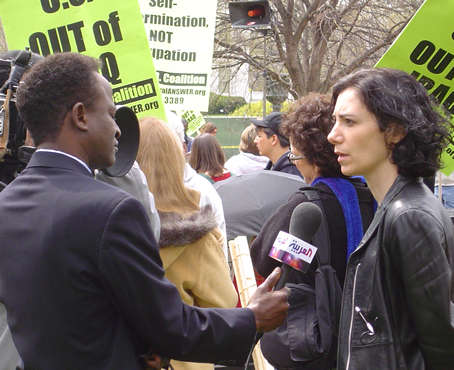
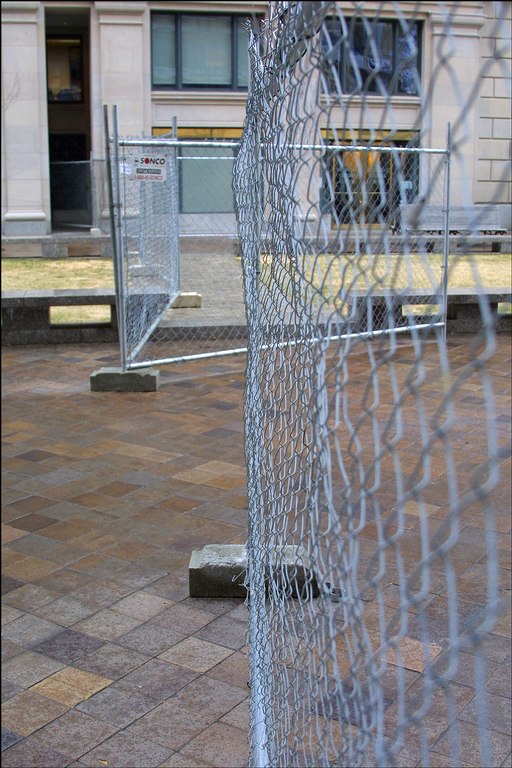
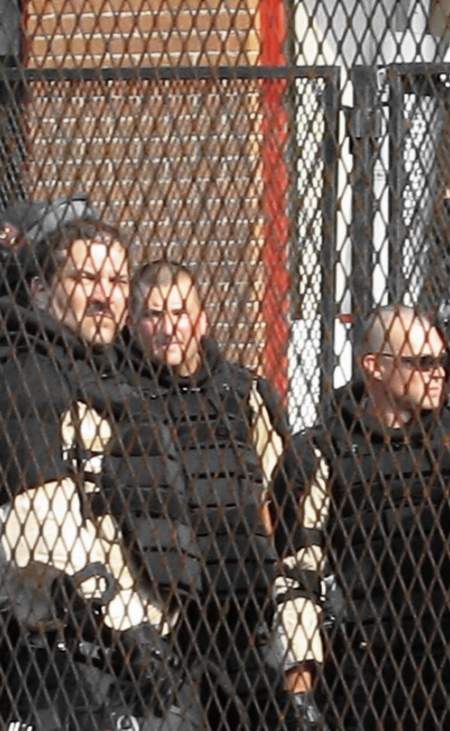
Mara Verheyden-Hilliard: Criminalizing Dissent
Criminalizing Dissent has chilled most free speech movement in the United States, especially when demonstrators take to the streets. We talk with attorney Mara Verheyden Hilliard co_founder of The Partnership for Civil Justice Legal Defense & Education Fund about criminalizing dissent, surveillance, data mining, fusion centers and the ability to exercise first amendment rights. A recent example were the violations of free speech during the mass arrests of protesters at the 2008 Republican National Convention. The demonizing of protesters and their message in the media will usually allow for the use of military force by police. That combined with intelligence gathering and targeting of lead organizers squelched the voice of dissent in all age groups.
Mara Verheyden Hilliard:
- A lot of our work is at the intersection of first and fourth amendment rights.
- PCJ has a class action suit pending from the world bank IMF protest – 8 year drag out tactic.
- “What they want to do is stage-manage democracy.”
- Victory: After years of litigation the government has to lift regulations on number of people at the Great Lawn
- Is it important to say that we don’t want to go back to Jan 19, 2001 just the day before Bush took office- or is there more that we have to do?
- We think there has to be an audit of every agency’s databases to determine exactly what the databases are.
- Identify what has been collected, where it has been put, who has access to that information,
- Then to tell people in the United States individually, what has been collected on them and then to expunge it.
- For people in their United States, their government collecting information, maintaining information, in these massive database files, that can be used by law enforcement, pulled up in a moment’s notice is really a very dangerous practice.
- What they’ve done is misuse existing databases and data tools.
Guest – Attorney Mara Verheyden Hilliard co-founder of The Partnership for Civil Justice Legal Defense & Education Fund.
————————————————-
Civil Liberties, Criminalizing Dissent, Extraordinary Rendition, Guantanamo, Habeas Corpus, Human Rights, Iraq Veterans, Iraq War, Military Tribunal, Supreme Court, Surveillance, Targeting Muslims, Torture, Truth to Power
Podcast: Play in new window | Download
The First 100 Days: Dismantling the Police State in a New Presidency – Part 1
This is the first of a three part special. Law and Disorder hosts bring a series of interviews with key attorneys, authors and activists from the front lines such as the Center For Constitutional Rights, Universities of Law and the National Lawyers Guild. Some of the police state policies are beginning to be reversed such as closing down secret CIA sites, a timeline to shut down Guantanamo, and mandating everyone CIA included follow US Army Field Manual Interrogation tactics.
We define the current laws in place that now constitute a police state. Then we look at the steps the Obama Administration must take to turn back the major breaches in civil liberties such as the Patriot Act One and Two, the Military Commissions Act, FBI Guidelines and legal provisions that allow for torture. As you’ll hear, some attorneys believe much of the dismantling can be done by executive order.
We begin with a description of what we have seen since September 11, 2001 and precursors such as the Effective Death Penalty Act, the earlier renditions under Clinton’s administration. Then, right after 9/11 came the overreaching of executive power in the form of signing statements that misuse the war powers resolution to detain, torture and try so_called enemy combatants. This includes racial profiling against Muslims here and abroad, massive surveillance capacities and warrant_less wiretapping.
The dismantling of police state blocks in the new presidency will take attention to detail to ensure a full restoration of democracy that will ultimately allow for social progress. In the next hour we look at some remedies and solutions to reverse laws that have created domestic enemy combatants, Guantanamo Bay prison, Renditions, Secret CIA sites, Torture, Kangaroo Courts: Special Trials, FISA, domestic surveillance, private military contractors.
——————————————————————

Executive Director of the Center for Constitutional Rights, Vince Warren discusses the abuse of preventive detention, torture, rendition and states secrets. Hosts cite recent examples of deep surveillance on peaceful protesters and the unprecedented collusion between federal, state and local law enforcement. Warren points out the importance of rolling back the police state measures put in place by the Bush administration, in that No president has ever given back the power a previous president has given him.
Vincent Warren:
- Torture/rendition/states secrets / right to dissent / the abuse of preventive detention.
- Torture top of list, the export of torture and CIA black sites.
- torture crimes at this time are unprosecutable adn its up to the president to
- Close Guantanamo prison – send prisoners back to countries they came from, repatriate.
- CCR and civil proceedings – hold accountable, the Bush administration to declare what they’ve done unconstitutional, damages to clients CCR represents and injunctive relief, future deterrents
- Universal jurisdiction stems from the Nuremberg principles that say a crime that is committed against a person anywhere is prosecutable anywhere.
- Countries such as Germany Spain and France have statutes for human rights abuse survivors to bring cases for prosecution.
- States secrets privilege, the privilige that the government has routinely invoked in a range of CCR cases, whenever the government says states secrets, the courts, including the supreme courts usually kick the case. The remedy?
- Congress can create a statute that limits the use of a states secrets power in order to make it consistent for truth telling and accountability.
- No president has ever given back the power a previous president has given him.
- The abuse of preventive detention, fusion centers – intelligence gathering and data mining – the concern is that no one can monitor and again its done in secrecy. no oversight, more preemptive law enforcement
- The irony here is that government usually acts as if one hand doesn’t know what the other hand is doing, unless they’re coming down on our constitutional rights, then they’re all on the same page.
——————————————————-



Naomi Wolf : 10 Steps
We’re joined by author and activist Naomi Wolf. She is the author of seven books, and the groundbreaking book The End of America: A Letter of Warning To A Young Patriot. In the book, Naomi addresses ten steps that societies, dictators, and sometimes democracies use to close an open society to move it toward facsism. We want to re-visit those ten steps.
Naomi Wolf:
- A small group of people used the law to subvert the law. Reichstag Fire, then disembowel their own Constitution.
- Initial thinking inspired from my friend who is the daughter of holocaust survivors, she said the Bush strategies echo early 1930s Germany.
- Enabling Acts in Germany gave the power to the state to read a person’s mail, listen to their phone calls and read their telegrams. This, in the alleged interest of national security and the fight against terrorism.
- Nazis used to unload the coffins of the war dead at night.
- A would-be dictator sought to close an open society or crush a democracy movement. Mussolini in 1920, the great evil pioneer. Hitler studied Mussolini, Stalin studied Hitler.
- I looked at Russia, studied Czechoslovakia in the 60’s, Pinochet’s coup in 1973, the Chinese crackdown on democracy in the 80s.
- What I saw was there was a blueprint. The blueprint has 10 steps. The 10 steps have been codified, they teach them at the School of the Americas.
- To help would be Latin-American dictators to overthrow their own governments. What terrified me is that those ten steps are being put in place by the Bush Administration.
- Invoke a terrifying internal and external enemy
- Create a gulag
- Develop a thug caste
- Set up an internal surveillance system
- Harass citizens’ groups
- Engage in arbitrary detention and release
- Target key individuals
- Control the press
- Dissent equals treason
- Suspend the rule of law
———————————————————








































